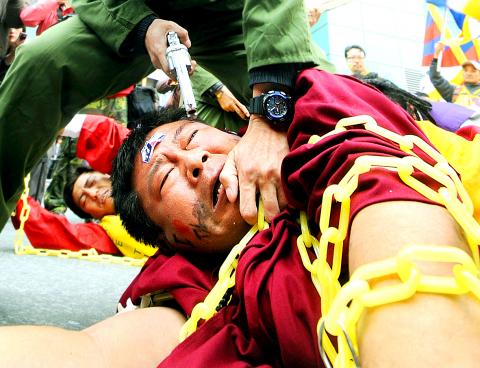Nearly 200 Tibetans and Taiwanese yesterday took to the streets in Taipei to voice their support for the independence and freedom of Tibet, while remembering those Tibetans who sacrificed their lives in an uprising against Chinese occupation of their country in 1959.
“Tibetans want to go home! The Dalai Lama wants to go home!” the crowd shouted as they marched. “Tibet belongs to Tibetans! Chinese Communist Party [CCP] get out of Tibet!”
Before the parade began, Tibetans performed a skit to show China’s repression of Tibetans.

Photo: Fang Pin-chao, Taipei Times
As the crowd rallied near Zhongxiao Fuxing MRT Station, three Tibetans dressed in traditional outfits ran out of the crowd, shouting “Free Tibet” and “Independence for Tibet.”
Soon, four others dressed in Chinese military uniforms ran after them, took them down, covered their mouths, tied them up with chains and pointed pistols at their heads.
“The ‘skit’ that the Tibetans just performed is not really a ‘skit,’ because it’s something that has happened a lot during the past decades to Tibetans living within Tibet under Chinese occupation,” said Son Yu-lian (孫友聯), secretary-general of the Taiwan Labour Front, which was one of several civic groups taking part in the Free Tibet parade.
Speaking to the demonstrators, Taiwan Friends of Tibet (TFOT) president Chow Mei-li (周美里) said that Tibetan spiritual leader the Dalai Lama’s announcement earlier in the week that he would retire from exile government functions was a “slap at the CCP regime.”
“Traditionally, the Dalai Lama serves as both the spiritual and political leader of Tibet, and never retires,” Chow said. “But now, even the Dalai Lama has announced his retirement — we want to ask when is the CCP government going to retire?”
She added that the current Dalai Lama had pushed for democratic reforms in exile, leading to the elections of a legislative body and the government-in-exile through popular votes by Tibetans living in exile. In addition to the mostly adult demonstrators, there was also a high school student, Own Ching-ning (翁慶寧), who came from Taoyuan to join the parade.
“It’s just natural for us Taiwanese to join the Tibetans in their struggle for freedom, because we’re all facing the same threat — China,” Own said. “Although many people may think it’s the business of the grown-ups to support the free Tibet movement, I think people in high school are old enough to show care for the world.”
Jesse Duffield, a New Zealander who has been living in Taiwan for four years, said he has participated in many events related to the Tibetan cause, “because of my support for the Tibetans’ right to determine their own future as an independent nation.”
Besides showing their support for Tibet’s freedom, the demonstrators also observed a minute of silence and prayed for people in Japan who are suffering from the devastation brought by a massive earthquake and tsunami on Friday.

Chinese spouse and influencer Guan Guan’s (關關) residency permit has been revoked for repeatedly posting pro-China videos that threaten national security, the National Immigration Agency confirmed today. Guan Guan has said many controversial statements in her videos posted to Douyin (抖音), including “the red flag will soon be painted all over Taiwan” and “Taiwan is an inseparable part of China,” and expressing hope for expedited reunification. The agency last year received multiple reports alleging that Guan Guan had advocated for armed reunification. After verifying the reports, the agency last month issued a notice requiring her to appear and explain her actions. Guan

A preclearance service to facilitate entry for people traveling to select airports in Japan would be available from Thursday next week to Feb. 25 at Taiwan Taoyuan International Airport, Taoyuan International Airport Corp (TIAC) said on Tuesday. The service was first made available to Taiwanese travelers throughout the winter vacation of 2024 and during the Lunar New Year holiday. In addition to flights to the Japanese cities of Hakodate, Asahikawa, Akita, Sendai, Niigata, Okayama, Takamatsu, Kumamoto and Kagoshima, the service would be available to travelers to Kobe and Oita. The service can be accessed by passengers of 15 flight routes operated by

GIVE AND TAKE: Blood demand continues to rise each year, while fewer young donors are available due to the nation’s falling birthrate, a doctor said Blood donors can redeem points earned from donations to obtain limited edition Formosan black bear travel mugs, the Kaohsiung Blood Center said yesterday, as it announced a goal of stocking 20,000 units of blood prior to the Lunar New Year. The last month of the lunar year is National Blood Donation Month, when local centers seek to stockpile blood for use during the Lunar New Year holiday. The blood demand in southern Taiwan — including Tainan and Kaohsiung, as well as Chiayi, Pingtung, Penghu and Taitung counties — is about 2,000 units per day, the center said. The donation campaign aims to boost

The Central Weather Administration (CWA) said a magnitude 4.9 earthquake that struck off the coast of eastern Taiwan yesterday was an independent event and part of a stress-adjustment process. The earthquake occurred at 4:47pm, with its epicenter at sea about 45.4km south of Yilan County Hall at a depth of 5.9km, the CWA said. The quake's intensity, which gauges the actual effects of a temblor, was highest in several townships in Yilan and neighboring Hualien County, where it measured 4 on Taiwan's seven-tier intensity scale, the CWA said. Lin Po-yu (林柏佑), a division chief at the CWA's Seismological Center, told a news conference